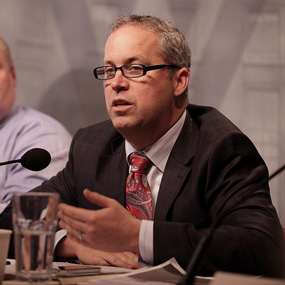-
Stacy VanDeveer: “Green Economy” May Bring More of the Resource Curse
July 12, 2013 By Jacob Glass
“We can’t talk about a ‘green economy,’ ‘green technologies,’ or ‘green energies’ only by talking about technologies that are stamped out at one end of a large global process and deployed for cleaner energy,” says Stacy VanDeveer in this week’s podcast.
“The green economy, or green energy transition, requires a lot of metals, and a whole lot of things that are mined,” he says. “Because of the scale of the industry now, the scale of the environmental and social change being driven by mining globally is actually quite stunning.”
“We can’t talk about a ‘green economy,’ ‘green technologies,’ or ‘green energies’ only by talking about technologies that are stamped out at one end of a large global process and deployed for cleaner energy,” says Stacy VanDeveer in this week’s podcast.
“The green economy, or green energy transition, requires a lot of metals, and a whole lot of things that are mined,” he says. “Because of the scale of the industry now, the scale of the environmental and social change being driven by mining globally is actually quite stunning.”
VanDeveer is an associate professor of political science at the University of New Hampshire, and co-author of ECSP’s recent report, Backdraft: The Conflict Potential of Climate Mitigation and Adaptation.
In his chapter, “Resource Curses: Redux, Ex-Post, or Ad Infinitum?,” VanDeveer writes that an unintended “backdraft” of the green economy may be more cases of the “resource curse” – the tendency of valuable natural resources in developing countries to bring more bad (corruption, pollution, violence, etc.) than good to the population. Coltan, lithium, and other rare earth metals associated with green technologies operate on the same boom-and-bust mining cycles that coal and other valuable resources have in the past, he says, creating the potential for instability, conflict, or misery in new countries coming into quick, commodity-driven riches without the ability to harness them for equitable growth.
Once established, VanDeveer says, the legacy of patron-client interactions, violent coercion, and corruption often prevalent in mining communities does not go away. “Even though coltan goes out of fashion, violence and money do not go out of fashion,” he says, pointing to the eastern Democratic Republic of Congo for example. “The legacy of those vicious politics persists.”
“Without a focused attention on where the stuff of the green economy or green energy transition comes from, ‘greening the resource curse’ is the most likely outcome,” VanDeveer says.
VanDeveer spoke at the Wilson Center on May 16. Download his slides to follow along.
Friday podcasts are also available for download from iTunes.
Topics: adaptation, conflict, development, DRC, economics, energy, environment, Friday Podcasts, land, minerals, mitigation, natural resources, podcast, poverty, security
 A Publication of the Stimson Center.
A Publication of the Stimson Center.



